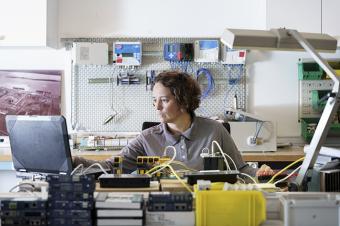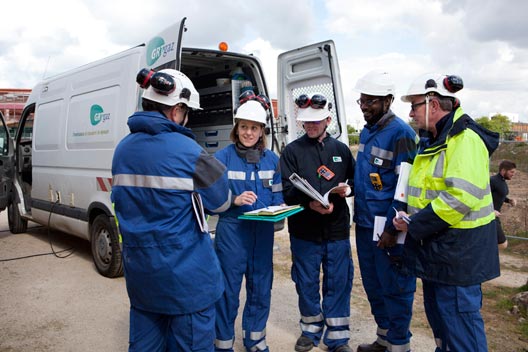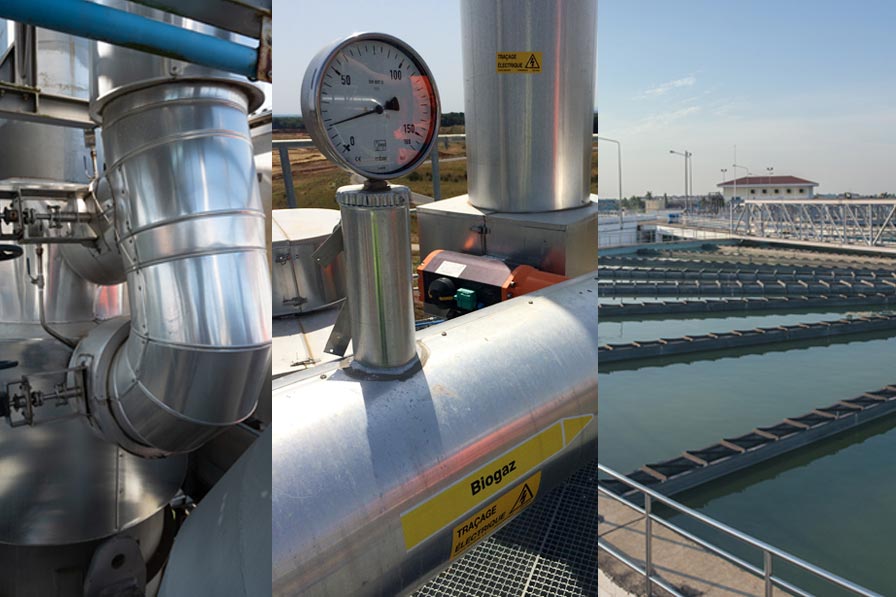Careers in the energy transition

Continuous development
GRTgaz has 27 different career fields and 3,300 employees. In our daily business, we all play an essential role in overcoming the collective challenge of the energy transition and achieving carbon neutrality. Our desire to replace natural gas with renewable and low-carbon gases is reflected in the adaptation of our transmission network and the emergence of new gas production methods. Every role at GRTgaz is involved in this drive. As part of its CAP24 transformation project, CSR approach and “École du gaz” training centre, GRTgaz is adapting its organisation and supporting its employees in reinventing their roles and practices.
Ever-evolving careers
The gas industry is changing with the times. While the core businesses remain the same, the processes, techniques and working methods are evolving to include renewable and low-carbon gases, hydrogen and the transport of CO2. Each role must be adapted to keep pace with the far-reaching developments associated with the energy transition: technological developments in materials and equipment, digitisation of tools, roll-out of a large number of sensors on the network and management of the associated data.
Thus, the energy transition is providing an opportunity for everyone in all professions to develop their know-how without having to change careers.
The specific features of hydrogen and renewable and low-carbon gases mean that the skills required of the various gas-related professions need to be broadened. These roles also need to incorporate the emergence of new biomethane production processes such as anaerobic digestion, pyrogasification (gas produced from solid waste) and hydrothermal gasification (gas produced from liquid or wet waste), Power to Methane and hydrogen production processes.
In the field of design, the multi-energy approach is demanding mastery of expertise in subjects that were once considered peripheral, such as chemistry, biology, agriculture and life sciences, and of processes such as water electrolysis.
Operating and maintenance roles are evolving to incorporate the new technical and regulatory requirements of hydrogen and renewable and low-carbon gases. They must also be adapted to the new installations (reverse flow stations, biomethane injection stations, etc.). This translates into a need for new operational skills such as fluid mechanics, electromechanics and industrial instrumentation and automation.
Testimony of Alicia Krol – experienced multi-skilled EC&I Technician (responsible for the maintenance of electrical systems, automatism, remote transmission and instrumentation)
“As a multi-skilled technician at GRTgaz, I experience, on a daily basis, the way in which the role of operating and maintaining gas stations is evolving as a result of automation and digitalisation. The purpose of my role has not changed i.e. to guarantee the safety and reliability of the gas transmission network, and more specifically, gas substations. What has changed is that these stations are now automated. Using intelligent sensors, PLCs record data relating to the metering, safety and quality of the gas. They continuously exchange data with the monitoring centre. As an EC&I technician, I make sure that the PLCs work properly and I ensure the quality of exchanges with the monitoring centre. I also make sure that the gas stations react appropriately to the information transmitted, in complete safety and autonomy (shutdown, restart, etc.).
As far as automation and remote transmission is concerned, maintenance is largely carried out remotely, except for commissioning and certain types of breakdown. Technological advances have enhanced the efficiency of our operations with high-performance solutions that make our gas network even more reliable and secure. They also strengthen our ability to adapt to the arrival of new gases (biomethane, hydrogen, CO2) that impose high demands in terms of safety and quality.
Personally, I see these developments as a great opportunity. New skills in automation, electricity and remote transmission broaden the sphere of professional potential and enrich my daily activities. What with remote maintenance, local presence and relations with companies working on the network, there is no such thing as routine. It is with great pride that I carry out this evolving and challenging job, every day, with safety and quality of service at its very heart.”
Like all lines of business today, the gas industry has taken a digital turn. Today’s professionals need to be able to handle data, work on interconnected equipment and use smart tools and measuring devices.
Operating and maintenance roles are particularly affected, with the development of remote maintenance tasks and procedural models in addition to carrying out preventive or corrective manual maintenance tasks which are always necessary.
In the Electricity, Instrumentation and Automation sector, the needs have increased with the development of biomethane injection stations and reverse flow stations.
Testimony of Jimmy Monmarthe – Deputy Sector Manager for Croissy-Coulommiers
“Assistant to the manager of the Croissy-Coulommiers sector, I'm responsible for maintaining GRTgaz’s first backhaul sites, and in particular, the pioneering site of Marchémorêt (in France’s Seine-et-Marne department). The arrival of biomethane has turned the rules of operation on their head.
Until now, the operator’s role was essentially to depressurize the gas and deliver it to the customer. A new problem has arisen with the operation of biogas plants – once set in motion, the production of biomethane cannot be interrupted. Therefore, the gas produced in excess in a given area must be transported to more suitable consumption areas. This involves compressing the gas and managing the flows downstream and upstream of the station. These changes have a major impact on the operator who must be able to maintain the new equipment, such as compressors and pressure regulators.
This upscaling of maintenance has been accompanied by developments in the role as a result of automation. Today, the transit of gas and the equipment required are controlled by automated systems, and we have to guarantee that they work. This means acquiring new skills, not only in electricity, but also in maintenance and fault diagnosis.
These two developments represent a real challenge for our operations teams. But that’s also what makes it such an exciting and motivating job, full of daily twists and turns. Without even changing jobs, you can acquire a wide range of skills that are invaluable to your career development. The development of biomethane has also raised my profile as an operator. Today, I have a profound sense that I too can make a real contribution to the energy transition.”
New and emerging careers
Supporting and setting up projects involving hydrogen or renewable and low-carbon gases
Careers in the commercial sector are also affected by the changing roles. Among the new careers, Business Developers and Account Managers are highly sought-after. Business Development is a pivotal role in the development of the hydrogen, renewable gas and low-carbon industries. It involves setting up concrete infrastructure projects or supporting new productions in coordination with local stakeholders from a very wide range of sectors (elected representatives, local authorities, farmers, manufacturers, private individuals, associations, etc.).
To be successful, Business Developers need to master a wide range of technical, legal and financial skills. They must also have excellent interpersonal skills to facilitate local cooperation between the different partners.
Testimony of François Martin - Business Developer
“A new job at GRTgaz, the role of Business Developer is to transform the company’s strategic commitment to developing the transport of hydrogen and CO2 into concrete projects. I like to think that I am the conductor of the orchestra at the interface between the idea and the ultimate decision to go ahead. As the linchpin between the in-house and the external teams, I discuss the customers’ needs with GRTgaz’s various internal business units. What’s my goal? To find the best compromise between that which is sustainable, efficient, pragmatic and achievable. As hydrogen and CO2 are unregulated sectors, it is the shareholders who make the decisions about investments. I have to give them all the keys to make their decisions. Once the project is up and running, I hand over to the technical teams, while maintaining customer relations.
With all the technical, legal, financial and interpersonal issues involved, routine is certainly not part of my daily life! Every project is different and requires analysis of multiple parameters. It's a hands-on job that requires a great deal of adaptability and dialogue to convince people of the project’s relevance, promote its acceptability, establish relationships of trust with all stakeholders and remove any obstacles. As a cross-functional role, the job of business developer also requires strong interpersonal and communication skills. You have to be patient. As in any innovative field, there have been more failures than successes in the development of hydrogen transport projects. Projects are built up, brick by brick, over several years. And it's the challenge of the business developer to reverse the trend by taking the time to discuss and analyse everything in order to propose realistic solutions for the energy transition, to ensure a more sustainable future.”
Research and Development
Research and Development is also a key line of business for the energy transition. At its Resarch & Innovation Center for Energy (RICE), GRTgaz offers a wide range of career opportunities with one main aim: remove technological barriers and drive the transformation of gas infrastructures forward to accommodate hydrogen and renewable and low-carbon gases.
Every day, our research engineers and technicians experiment with technologies, analyse phenomena and develop technical responses to the major transformations in the energy sector.
Testimony of Elodie Joly - Measurement Research Technician
“The development of renewable and low-carbon gas poses new challenges for GRTgaz in terms of the quality of gas, standards and safety. At RICE, GRTgaz's Research and Innovation Centre for Energy, we are preparing the gas transmission system of the future. The challenge is to guarantee the integrity of the infrastructure needed to transport and inject the new gases safely. To achieve this, GRTgaz needs to have perfect knowledge of these gases. That is my main job. As a measurement technician in the PCG (Processes and Gas Characterisation) division, I am currently analysing the quality and composition of syngas produced by various emerging technologies such as pyrogasification, hydrothermal gasification and Power to Methane. It's a long-term job because every change in input modifies the characteristics of the gas produced. The results of the analyses help to establish future standards and recommendations for a future transport network that is adapted, safe and reliable.
On a daily basis, my job combines laboratory analysis and travel to R&D pilot sites to take samples. Routine is not part of my team’s vocabulary. Out in the field, we encounter evolving and changing conditions when faced with gases with unknown characteristics (pressure, flow rate, volume, etc.). We have to constantly improve our working techniques. In the laboratory, we have a vast array of analytical equipment to study a wide and diverse range of compounds. At RICE, our curiosity and critical spirit are always on the alert. Every detail can change the results of an analysis. You have to be able to adapt and react quickly.
Over and above the technical aspects and the team spirit, working in R&D gives my work profound meaning. At GRTgaz, I am helping to advance the energy transition. What better motivation than knowing that you’re working to provide the solutions of tomorrow?”


